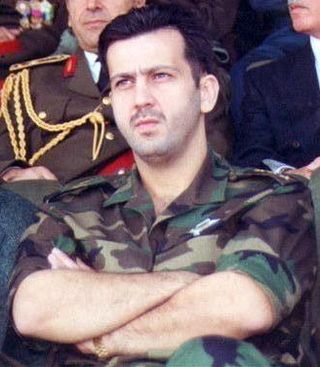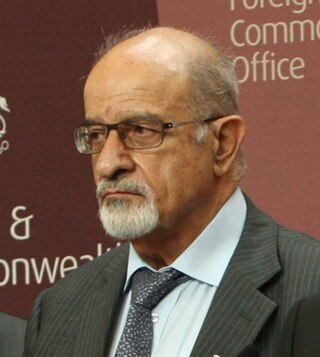
Bashar al-Assad is a Syrian politician who is the 19th and current president of Syria since 2000. In addition,he is the commander-in-chief of the Syrian Armed Forces and the secretary-general of the Central Command of the Arab Socialist Ba'ath Party. He is a son of Hafez al-Assad,who was President of Syria from 1971 to 2000.

Muhammad Naji al-Otari is a Syrian politician who was Prime Minister of Syria from 2003 to 2011.

Abdul Halim Khaddam was a Syrian politician who served as interim President of Syria in 2000. He also was Vice President of Syria and the Syrian High Commissioner to Lebanon from 1984 to 2005. He was long known as a loyalist of Hafez Assad. He resigned from his position and left the country in 2005 in protest against certain policies of Hafez's son and successor,Bashar Assad. He accumulated substantial wealth while in office:a Credit Suisse account in his name,opened in 1994,had nearly 90 million Swiss francs in September 2003,per Suisse secrets. This puts Khaddam and his family's net worth at $1.1 billion,making them one of the wealthiest and most influential political families in the Middle East.

Major General Maher al-Assad is a Syrian military officer and commander of the Syrian Army's elite 4th Armoured Division,which,together with Syria's Military Intelligence,forms the core of the country's security forces. He is the younger brother of Syrian president Bashar al-Assad,and also a member of the Central Committee of the Syrian Ba'ath Party.

Assef Shawkat was a Syrian military officer who was the Deputy Minister of Defense of Syria from September 2011 until his death in July 2012.
Hasan Ali Turkmani was a prominent Syrian military commander and Ba'ath Party member. He served as Syria's Minister of Defense from 2004 to 2009.

The Cabinet of Syria or Council of Ministers is the chief executive body of the Syrian Arab Republic.

Haitham al-Maleh is a Syrian human rights activist and former judge. He is a critic of the current Syrian government under Bashar al-Assad and has been imprisoned by the Syrian government because he was calling for constitutional reforms. Maleh became an important opposition figure in the Syrian Civil War.
Adel Safar is a Syrian politician and academic,who served as Prime Minister of Syria from 14 April 2011 to 23 June 2012. His government was dissolved by Bashar al-Assad as a result of the Syrian parliamentary election in 2012. He was Minister of Agriculture and Agrarian Reform from 2003 to 2011.
Mohammad al Jillati is a Syrian economist and financial expert,who served as the minister of finance from April 2011 to 9 February 2013.

Sufian Allaw is a Syrian former politician who served as the oil minister of Syria from 2006 to 2013.
International reactions to the Syrian civil war ranged from support for the government to calls for the government to dissolve. The Arab League,United Nations and Western governments in 2011 quickly condemned the Syrian government's response to the protests which later evolved into the Syrian civil war as overly heavy-handed and violent. Many Middle Eastern governments initially expressed support for the government and its "security measures",but as the death toll mounted,especially in Hama,they switched to a more balanced approach,criticizing violence from both government and protesters. Russia and China vetoed two attempts at United Nations Security Council sanctions against the Syrian government.

Dawoud Abdallah Rajiha was a Syrian military officer who was the Minister of Defense from 2011 to July 2012 when he was assassinated along with other senior military officers in a bombing claimed by Syrian rebel forces during the country's Civil War. From 2009 to 2011,Rajiha served as chief of staff of the Syrian Army.
Protests began in Syria as early as 26 January 2011,and erupted on 15 March 2011 with a "Day of Rage" protest generally considered to mark the start of a nationwide uprising. The Syrian government's reaction to the protests became violent on 16 March,and deadly on 18 March,when four unarmed protesters were killed in Daraa.

The Syrian opposition is the political structure represented by the Syrian National Coalition and associated Syrian anti-Assad groups with certain territorial control as an alternative Syrian government.
This article details the Syrian government's response to protests and civilian uprisings of the Syrian revolution which began in early 2011,that unravelled the socio-political stability of Syria,eventually plunging the country into a nationwide civil war by mid-2012.
The 18 July 2012 Damascus bombing of the National Security headquarters in Rawda Square,Damascus,killed and injured a number of top military and security officials of the Syrian government. Among the dead were the Syrian Defense Minister and Deputy Defense Minister. The bombing occurred during the Syrian Civil War,and is considered to be one of the most notorious events to affect the conflict. Syrian state-controlled television reported that it was a suicide attack while the opposition claimed it was a remotely detonated bomb.

Ahmad Moaz Al-Khatib Al-Hasani is a former president of the National Coalition for Syrian Revolutionary and Opposition Forces. He is also a former imam of the Umayyad Mosque in Damascus.
Najm Hamad Al Ahmad is a Syrian jurist and justice minister from 2012 until 2017.

The Adel Safar government was the third Syrian government formed during the presidency of Bashar al-Assad. On 2 April 2011,President Bashar al-Assad issued Decree No. 134 designating Adel Safar to form a new Government. On 14 April 2011,the new Government was announced through Decree No. 136.










